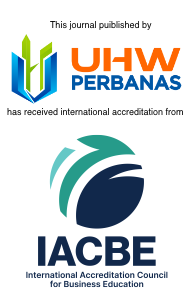About the Journal
The Indonesian Accounting Review (TIAR)l is published by the Center for Research and Community Service of Hayam Wuruk Perbanas University. This journal has been accredited by the Indonesian Ministry of Higher Education with Sinta 2 status.
Aims and Scope
Accounting encompasses more than mere numerical analysis; it also involves dimensions of power, culture, and politics. In this regard, the Indonesian Accounting Review (TIAR) examines the social and political dimensions of accounting to enhance its relevance within Indonesia. Given the country's significant diversity, accounting must transcend technical considerations, serving as a framework for understanding societal resource management, trust-building, and power dynamics. Each numerical figure conveys a narrative imbued with societal, political, and cultural significance. In the Indonesian context, it is imperative to perceive accounting not merely as numerical data but as a social practice that both influences and is influenced by local communities. Consequently, disciplines such as Financial Accounting, Management Accounting, Auditing, Accounting Information Systems and Technology, Behavioral Accounting, Corporate Governance, Accounting Ethics, Tax Accounting, Public Sector Accounting, and Social Accounting in Indonesia necessitate examination from multiple perspectives. The Indonesian Accounting Review explores these topics by accepting various research methodologies, including quantitative surveys, case studies, interviews, discourse and content analysis, archives, case studies, conceptual thinking, experimental methods, and others.
History
In the beginning, TIAR was a journal published in Indonesian. Volume 1, number 1 was released in 2011. It was published by the Department of Accounting at Hayam Wuruk Perbanas University (formerly known as STIE Perbanas Surabaya). The initial publication was aimed at internal distribution for lecturers and accounting students. As it developed, starting from volume 3 number 1 in 2013, to reach a broader and more global audience, the TIAR journal began publishing in English. With the growing interest in publication, TIAR started to become known in the accounting community in Indonesia. Especially after receiving an accreditation rating of Sinta 2 from the Directorate of Higher Education of Indonesia, which further solidified its status as an Indonesian accounting journal, TIAR established a policy and chose an editorial focus to publish scientific articles on Indonesian accounting.
Yes, accounting in the Indonesian way. TIAR has taken a strategic step to strengthen its position as a leading accounting journal in Indonesia. By adopting a policy to publish scientific articles focusing on Indonesian accounting, TIAR demonstrates its commitment to the development and dissemination of accounting knowledge relevant to the local context. This approach allows the journal to explore and discuss accounting issues that are unique and specific to Indonesia's business environment, regulations, and accounting practices. TIAR’s decision to prioritize “accounting the Indonesian way” reflects a deep understanding of the importance of adapting accounting principles and practices to the needs and characteristics of the national economy. This may include discussions on the application of international accounting standards in the Indonesian context, analysis of the impact of local financial regulations on accounting practices, or case studies that illustrate unique challenges and solutions in implementing accounting systems in Indonesian companies. Thus, TIAR not only contributes to global accounting literature, but also strengthens the relevance and applicability of accounting research for stakeholders in Indonesia.
Indonesia possesses a rich diversity of languages, cultures, and customs spread across the archipelago. There are more than 700 languages and 1,300 ethnic groups, each shaping distinct socio-cultural structures within their respective communities. This uniqueness presents its own potential for further research. On the other hand, accounting encompasses more than just numerical analysis; it also involves dimensions of power, culture, and politics. Understanding accounting in the Indonesian context is a fascinating area to explore. Given the significant diversity within the country, accounting must go beyond technical considerations and serve as a framework for understanding the management of communal resources, building trust, and the dynamics of power. Every numerical figure conveys a story rich with social, political, and cultural significance.
In the context of Indonesia, it is important to view accounting not merely as numerical data, but as a social practice that both influences and is influenced by the local community. Accounting disciplines such as Financial Accounting, Management Accounting, Auditing, Accounting Information Systems and Technology, Behavioral Accounting, Corporate Governance, Accounting Ethics, Tax Accounting, Public Sector Accounting, and Social Accounting in Indonesia require examination from various perspectives.
Distinctive Features
- Focusing attention on the science and practice of accounting within the context of Indonesia's economic, social, and cultural landscape.
- Integrating global accounting practices by adapting to local Indonesian cultural, social, and political contexts,
- Enriching the discipline of accounting by bringing Indonesian contextual narratives to the international stage.
These themes indicate TIAR’s commitment to advancing research that addresses both technical and cultural dimensions of accounting in Indonesia.
Consistency in Publication Ethics and Reviewer Reputation
The quality of the editorial process and peer-review system also shapes academic perceptions of article credibility. TIAR’s editorial board prioritizes methodological rigor and blind review, ensuring the scientific validity of publications.
Quality Aspects of TIAR Articles
Originality and Topic Relevance. Most TIAR articles address current issues such as ESG, audit governance, green accounting,and financial report sustainability, aligning with global accounting research trends and domestic needs.
Robust Research Methodology. TIAR articles frequently employ quantitative methods like panel regression, SEM, secondary data analysis from the Indonesia Stock Exchange (BEI), and cross-sector empirical validation. Published works meet international research standards, particularly in audit, IFRS adoption, and corporate governance.
Theoretical and Practical Contributions. TIAR publications often expand accounting theories (e.g., agency, stakeholder, legitimacy) to examine local phenomena while offering practical recommendations for implementing financial reporting standards in Indonesia.
Collaboration and International Exposure. The trend of international collaboration in TIAR continues to grow, enhancing quality, methodology, and cross-publication citation opportunities across regions.
Format and Accessibility. TIAR articles typically include English abstracts, DOIs, international-standard references, and open-access availability, strengthening visibility and academic recognition.
SINTA Evaluation and Other Benchmarks
TIAR’s h-index stands at 32, with an i10-index of 100, indicating high citation rates and consistent quality over the past five years.
The number of citations per article and citation trends continue to grow, even without full Scopus indexing, reflecting the academic community’s trust in the journal’s quality.
Overall, TIAR’s research articles are considered high-quality and competitive with other national accounting journals, particularly due to their topic relevance, methodological strength, and theoretical/practical contributions to Indonesian accounting.
Analyze citation growth patterns for The Indonesian Accounting Review
Based on official data from the SINTA (Science and Technology Index) portal in 2025, the journal The Indonesian Accounting Review (TIAR) has a high citation impact in both national and international academic circles. As of October 2025, there are over 3,452 Google Scholar citations for articles published in TIAR, with an h-index of 32 and an i10-index of 100.
The citation growth pattern for The Indonesian Accounting Review (TIAR) demonstrates a substantial and consistent increase over recent years. As of 2025, TIAR has accrued 3,452 citations on Google Scholar, up from 2,922 since 2020. This trend reflects a steady rise in citation activity and scholarly impact, with the h-index increasing from 31 (since 2020) to 32 overall—indicative of a broadening influence in the academic community.
Citation Growth Details
- Total citations: 3,452 (as of 2025)
- Citations since 2020: 2,922
- h-index: 32 overall, 31 since 2020
- i10-index: 100 overall, 90 since 2020
The majority of the journal's citation growth has occurred in the last five years, with roughly 85% of all its citations originating since 2020. The h-index and i10-index increases mirror this positive trend, reinforcing the journal's enhanced relevance and scholarly reach.
This citation trajectory demonstrates that TIAR’s visibility, relevance, and scholarly engagement have accelerated sharply in the most recent half-decade.
We invite you to participate by contributing your research findings for publication in The Indonesian Accounting Review (TIAR) journal, to provide insights and further the advancement of accounting practices in Indonesia. TIAR explores these topics by accepting a wide range of research methodologies, including quantitative surveys, case studies, interviews, discourse and content analysis, archives, conceptual thinking, experimental methods, and more.
Submit your research articles now.
















